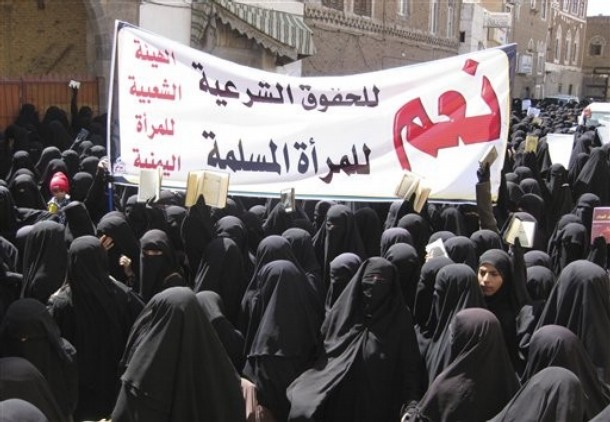
Categorized the worst place to be for a woman, back in November 2013, two years after the Arab Spring movement swept across the Middle East, the women of Yemen remained determined to turn the impoverished nation into a modern civil state where women are respected and protected within their own rights, free from patriarchal stereotypes, in keeping with principles of equality and personal freedom.
While 2011 saw the rise of strong female persona, Tawakkul Karman and Amal Basha come to mind; Yemen’s political landscape has nevertheless remained overwhelmingly dominated by male politicians.
With a female literacy rate of 35%, a female to male income ratio of 30:100 and extremely low level of educational attainment, Yemen has a long way to go before its women could ever hope to attain their revolutionary goals. While efforts have been exerted by officials, among whom Human Rights Minister Hooriah Mashour in relation to women rights and the implementation of much needed judicial reforms, the impoverished nation has failed so far to capitalize on its revolutionary momentum.
As per noted by Human Rights Watch in previous assessment reports on Yemen, the country essentially lacks in term of opportunities. Unlike their male counterparts, women in Yemen face a series of challenges, whether social, religious or even judicial for them to be able to fully enjoy and practice their rights. For example, many women have not yet managed to obtain their identification card, which has of course hindred their ability to exercise their voting rights.
But beyond a simple matter of rights, lies a deeper issue, one which would require much more than just legal reforms or funding: gender discrimination.
According to Human Rights Watch, gender discrimination and gender based violence are preventing Yemen from moving forward in its social reforms. In November, the rights group called on the coalition government to amend the constitution as to address such issues. HRW has been campaigning “to get all provisions that discriminate against women removed, as well as granting women equal rights within marriages, and setting a minimal age for marriage at age 18.”
Minister Mashour has over the past few months often voiced her support for such reforms as she explained that only then would Yemen have truly answered its people for change and desire to build a fairer society. However, while many rights campaigners have hailed such efforts, conservative politicians and religious figures have vehemently opposed any change which they feel would clash with Islamic tradition, especially in relation to family law.
Conservatives have argued that in order for Yemen to fully embrace democracy, the country need not to renege on its Islamic tradition, stressing that rather than look at reforming marriage, divorces and inheritance laws, the authorities should concentrate on providing better health care and protection for women.
But all is not gloom and doom for the women of Yemen.
Back in February, Abdul Karim Ali Al-Eryani, former Prime Minister and former NDC representative explained on the side line of a Council on Foreign Relations discussion, that progress had been made in regards to the inclusion of women within the political arena.
Most notably, Yemen National Dialogue Conference included several women within its quorum. 30% of Yemen NDC representatives were women; a huge achievement for a society as traditional as Yemen.
Moreover, the NDC recommended that a quota of 30% female participation be respected and implemented throughout all state institutions as to ensure fairer representation and address gender discrimination. While indeed such recommendations are in no way legally binding it is likely progress will nevertheless be made in that regard, enough to build on.
cheat on my husband
online catch a cheater